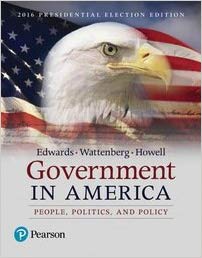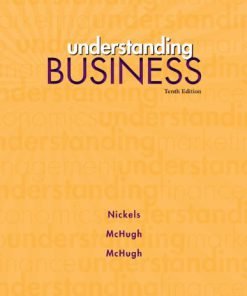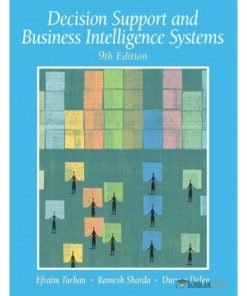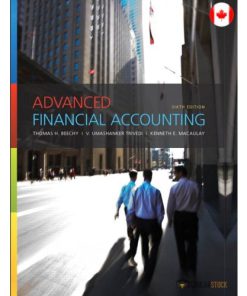Test Bank for Government in America: People, Politics, and Policy, 17th Edition
$35.00 Original price was: $35.00.$26.50Current price is: $26.50.
Test Bank for Government in America: People, Politics, and Policy, 17th Edition
Sell by: Chase Gilbert
SKU: gvxeh490258
Category: Test Bank
Instant download Test Bank for Government in America: People, Politics, and Policy, 17th Edition pdf docx epub after payment.

Product details:
- ISBN-10 : 0134586573
- ISBN-13 : 978-0134586571
- AUthor: Edwards; Wattenberg; Howell
Ships fast and free directly from Amazon. SUPPORT MY NEW BOOK BUSINESS! Buy with confidence! Book may have writing/highlighting on some of the pages and may have wear on cover. Book may not contain original supplemental material.
Table of contents:
- Part I Constitutional Foundations
- 1 Introducing Government in America
- Government
- Politics
- The Policymaking System
- People Shape Policy
- Policies Impact People
- Democracy in America
- Traditional Democratic Theory
- Three Contemporary Theories of American Democracy
- Challenges to Democracy
- American Political Culture and Democracy
- The Scope of Government in America
- How Active Is American Government?
- Review the Chapter
- Learn the Terms
- Explore Further
- 2 The Constitution
- Politics in Action: Amending the Constitution
- The Origins of the Constitution
- The Road to Revolution
- Declaring Independence
- The English Heritage: The Power of Ideas
- The American Creed
- Winning Independence
- The “Conservative” Revolution
- The Government That Failed: 1776–1787
- The Articles of Confederation
- Why It Matters Today: A Strong National Government
- Changes in the States
- Economic Turmoil
- The Aborted Annapolis Meeting
- Making a Constitution: The Philadelphia Convention
- Gentlemen in Philadelphia
- Philosophy into Action
- Critical Issues at the Convention
- The Equality Issues
- Why It Matters Today: Representation in the Senate
- Point to Ponder
- The Economic Issues
- The Individual Rights Issues
- The Madisonian System
- Thwarting the Tyranny of the Majority
- Why It Matters Today: Checks and Balances
- The Constitutional Republic
- The End of the Beginning
- Ratifying the Constitution
- Federalists and Anti-Federalists
- Ratification
- Changing the Constitution
- The Formal Amending Process
- You are the Policymaker: How Frequently Should We amend the Constitution?
- The Informal Processes of Constitutional Change
- The Importance of Flexibility
- Understanding the Constitution
- The Constitution and Democracy
- The Constitution and the Scope of Government
- Review the Chapter
- Learn the Terms
- Explore Further
- 3 Federalism
- Politics in Action: Conflict Between Levels of Government
- Defining Federalism
- Why Federalism?
- The Constitutional Basis of Federalism
- The Division of Power
- Why It Matters Today: Protecting rights
- National Supremacy
- Why It Matters Today: Commerce Power
- States’ Obligations to Each Other
- Intergovernmental Relations
- From Dual to Cooperative Federalism
- Devolution?
- Fiscal Federalism
- Point to Ponder
- Why It Matters Today: Grants-in-Aid
- Diversity in Policy
- You are the Policymaker: Should Whether You Live Depend on Where You Live?
- Understanding Federalism
- Federalism and Democracy
- Federalism and the Scope of the National Government
- Review the Chapter
- Learn the Terms
- Explore Further
- 4 Civil Liberties and Public Policy
- Politics in Action: Free Speech on Campus
- The Bill of Rights
- The Bill of Rights—Then and Now
- The Bill of Rights and the States
- Freedom of Religion
- The Establishment Clause
- Why It Matters Today: The Establishment Clause
- The Free Exercise Clause
- You are the Judge: The Case of Animal Sacrifices
- Freedom of Expression
- Prior Restraint
- You are the Judge: The Case of the Purloined Pentagon Papers
- Free Speech and Public Order
- Obscenity
- You are the Judge: The Case of the Drive-in Theater
- Libel and Slander
- Why It Matters Today: Libel Law
- Symbolic Speech
- Free Press and Fair Trials
- Commercial Speech
- Regulation of the Public Airwaves
- Campaign Spending
- Freedom of Assembly
- Right to Assemble
- Right to Associate
- You are the Judge: The Case of the Nazis’ March in Skokie
- Right to Bear Arms
- Point to Ponder
- Defendants’ Rights
- Searches and Seizures
- Self-Incrimination
- The Right to Counsel
- You are the Judge: The Case of the Enticed Farmer
- Trials
- Cruel and Unusual Punishment
- The Right to Privacy
- Is There a Right to Privacy?
- Controversy over Abortion
- You are the Judge: The Case of the First Offender
- Understanding Civil Liberties
- Civil Liberties and Democracy
- Civil Liberties and the Scope of Government
- Review the Chapter
- Learn the Terms
- Key Cases
- Explore Further
- 5 Civil Rights and Public Policy
- Politics in Action: Launching the Civil Rights Movement
- The Struggle for Equality
- Conceptions of Equality
- The Constitution and Inequality
- African Americans’ Civil Rights
- Slavery
- Reconstruction and Segregation
- Equal Education
- Why It Matters Today: Brown v. Board of Education
- The Civil Rights Movement and Public Policy
- Voting Rights
- The Rights of Other Minority Groups
- Native Americans
- Hispanic Americans
- Asian Americans
- Arab Americans and Muslims
- The Rights of Women
- The Battle for the Vote
- The “Doldrums”: 1920–1960
- The Second Feminist Wave
- Women in the Workplace
- Why It Matters Today: Changes in the Workplace
- You are the Judge: Is Male-Only Draft Registration Gender Discrimination?
- Sexual Harassment
- Other Groups Active Under the Civil Rights Umbrella
- Civil Rights and the Graying of America
- Civil Rights and People with Disabilities
- LGBT Rights
- Affirmative Action
- Point to Ponder
- You are the Judge: the Case of the New Haven Firefighters
- Understanding Civil Rights and Public Policy
- Civil Rights and Democracy
- Civil Rights and the Scope of Government
- Review the Chapter
- Learn the Terms
- Key Cases
- Explore Further
- Part II People and Politics
- 6 Public Opinion and Political Action
- Politics in Action: The Limits of Public Understanding of Health Care Reform
- The American People
- The Immigrant Society
- You are the Policymaker: Should Immigration Be Based More on Skills than Blood ties?
- The American Melting Pot
- The Regional Shift
- The Graying of America
- How Americans Learn About Politics: Political Socialization
- The Process of Political Socialization
- Political Learning over a Lifetime
- Measuring Public Opinion and Political Information
- How Polls Are Conducted
- The Role of Polls in American Democracy
- What Polls Reveal About Americans’ Political Information
- Point to Ponder
- Why It Matters Today: Political Knowledge of the Electorate
- The Decline of Trust in Government
- What Americans Value: Political Ideologies
- The Influence of Political Ideology on Political Behavior
- How Americans Participate in Politics
- Conventional Participation
- Protest as Participation
- Class, Inequality, and Participation
- Why It Matters Today: Political Participation
- Understanding Public Opinion and Political Action
- Public Attitudes Toward the Scope of Government
- Democracy, Public Opinion, and Political Action
- Review the Chapter
- Learn the Terms
- Explore Further
- 7 The Mass Media and the Political Agenda
- The Mass Media Today
- The Development of Media Politics
- The Print Media
- The Emergence of Radio and Television
- Government Regulation of Electronic Media
- From Broadcasting to Narrowcasting: The Rise of Cable and Cable News
- The Impact of the Internet
- You are the Policymaker: What Should be Done About the Digital Divide?
- Private Control of the Media
- Reporting the News
- Finding the News
- Presenting the News
- Why It Matters Today: The Increasing Speed of News Dissemination
- Bias in the News
- The News and Public Opinion
- Policy Entrepreneurs and Agenda Setting
- Understanding the Mass Media
- The Media and the Scope of Government
- Individualism and the Media
- Point to Ponder
- Democracy and the Media
- Review the Chapter
- Learn the Terms
- Explore Further
- 8 Political Parties
- Politics in Action: Party Polarization on Immigration Policy
- The Meaning of Party
- Tasks of the Parties
- Why It Matters Today: Political Parties
- Parties, Voters, and Policy: The Downs Model
- The Party in the Electorate
- The Party Organizations: From the Grass Roots to Washington
- Local Parties
- The 50 State Party Systems
- You are the Policymaker: Should Political Parties Choose Their Nominees in Open or Closed Primaries?
- The National Party Organizations
- The Party in Government: Promises and Policy
- Party Eras in American History
- 1796–1824: The First Party System
- 1828–1856: Jackson and the Democrats Versus the Whigs
- 1860–1928: The Two Republican Eras
- 1932–1964: The New Deal Coalition
- 1968–Present: Southern Realignment and the Era of Divided Party Government
- Third Parties: Their Impact on American Politics
- Why It Matters Today: Divided Party Government
- Understanding Political Parties
- Democracy and Responsible Party Government: How Should We Govern?
- American Political Parties and the Scope of Government
- Review the Chapter
- Learn the Terms
- Explore Further
- 9 Campaigns and Voting Behavior
- Politics in Action: How running For Office Can Be More Demanding Than Governing
- The Nomination Game
- Competing for Delegates
- Point to Ponder
- Why It Matters Today: Early Delegate Contests
- The Convention Send-Off
- The Campaign Game
- The High-Tech Media Campaign
- Organizing the Campaign
- Money and Campaigning
- Regulations on Campaign Contributions
- Regulations on Independent Political Expenditures
- Are Campaigns Too Expensive?
- Does Money Buy Victory?
- Why It Matters Today: Money and Elections
- The Impact of Campaigns
- Whether to Vote: A Citizen’s First Choice
- Deciding Whether to Vote
- Registering to Vote
- Who Votes?
- Why It Matters Today: Youth Turnout
- How Americans Vote: Explaining Citizens’ Decisions
- Party Identification
- Candidate Evaluations: How Americans See the Candidates
- Policy Voting
- 2016: An Election Like No Other
- The Last Battle: The Electoral College
- You are the Policymaker: Should We Make Every State a Battleground by Electing the President by a Na
- Understanding Campaigns and Voting Behavior
- Are Nominations and Campaigns Too Democratic?
- Do Elections Affect Public Policy?
- Do Campaigns Lead to Increases in the Scope of Government?
- Review the Chapter
- Learn the Terms
- Explore Further
- 10 Interest Groups
- Politics in Action: How the Beverage Industry Mobilized to Stop a Sugar tax
- Theories of Interest Group Politics
- The Role of Interest Groups in Politics
- Pluralism
- Elitism
- Hyperpluralism
- Point to Ponder
- Why It Matters Today: Theories of Interest Group Politics
- What Makes an Interest Group Successful?
- The Surprising Effectiveness of Small Groups
- Intensity
- Financial Resources
- How Groups Try to Shape Policy
- Lobbying
- Electioneering
- Why It Matters Today: PACs
- You are the Policymaker: Should PACs Be Eliminated?
- Litigating
- Going Public
- Types of Interest Groups
- Economic Interests
- Environmental Interests
- Equality Interests
- Consumer and Other Public Interest Lobbies
- Understanding Interest Groups
- Interest Groups and Democracy
- Interest Groups and the Scope of Government
- Review the Chapter
- Explore Further
- Learn the Terms
- Part III The Policymakers
People also search:
Government in America: People, Politics, and Policy, 17th Edition
Government in America: People, Politics, and Policy, 17th Edition pdf
Government in America: People, Politics, and Policy
government in the american revolution
|
what is the us government doing right now
|
Related products
Sale!
Sell by: Trevor Lawrence
Sale!
Sell by: Spencer Lowe
Sale!
Test Bank
Test Bank for Decision Support and Business Intelligence Systems, 9th Edition: Efraim Turban
Sell by: Andrew Walker
Sale!
Sell by: Hannah Edwards
Sale!
Sell by: Matthew Clark
Sale!
Sell by: Scarlett Reed
Sale!
Sell by: Joshua Sanchez
Sale!
Sell by: Shane Gardner











